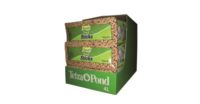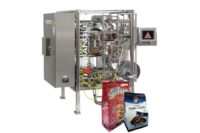It all began with digital label printing. But now, Wausau, Wisconsin-based Roastar is a full-blown flexible packaging company, having just increased its pouch-making prowess with the startup of a new Mamata flat-bottom pouch machine, which was initiated at its facility on November 1.
“Over the last five years, we transitioned into being a flexible packaging company,” Roastar president Will Reif says of the company, formerly known as Planet Label. “We’re focused on fast lead times, which, of course, go well with digital printing. We’re focused on short-run, quick-turnaround pouches.”
Then known as Planet Label, the company moved into digital printing in 2007 and soon after found success making pre-made pouches for the coffee market (hence its more recent name, Roastar). It purchased its first pouch line in 2011 for the purpose of making side-gusseted pouches, and followed that up with the purchase of two standup pouch lines in 2013. And most recently, Roaster added flat-bottom pouches to its repertoire, an equipment purchase that came as a result of ongoing customer feedback.
“Just by exhibiting at the coffee trade shows, we had been asked about that style of pouch over and over again,” Reif says. “It was probably our No. 1 request whenever we walked away from a show. That bag style had really peaked people’s interest. That’s what made us look at it in the beginning.”
So what was so attractive about flat-bottom pouches? Reif says Roastar’s customers liked the way it presented itself on the store shelf and also liked how a zipper could be integrated into the package. Reif says zippers are more effective when it comes to keeping coffee fresh and preventing spillage compared to conventional tin ties or bag tape.
“There’s also just the element that (the flat-bottom pouch) looks different,” he explains. “There’s not new bag styles that come out every day, so the smaller coffee roasters are seeing this bag style being put out by some of the bigger roasters. It has caught their attention. It’s a differentiator from a look standpoint.”
Roastar purchased the pouch line this past year, bringing its capabilities to four lines total. The decision wasn’t just made based on feedback from the company’s coffee customers, but for the potential there is when it comes to the new markets Roastar has branched in to recently — pet treats and specialty food.
The machine can be run on either a one-up or two-up basis for large format and small format pouches, respectively. Maximum output is 150 per minute on the two-up format.
“As far as our pouching capabilities, we can make side-gusseted pouches, standup pouches, three-side seal and now flat-bottom pouches,” Reif says. “All of those capabilities are here under one roof combined with the digital print.”
Speaking of digital printing, Roastar’s pouch lines are exclusively dedicated to pouching for its own print. But, as Reif explains, the prohibitive factor involved in digital printing has historically been the width, which is why the company used to exclusively be just a label printer for small format flexible packaging. As digital printing equipment evolved into bigger printing widths, it allowed Roastar to pursue other opportunities within flexible packaging. For instance, in 2014, the company purchased a printer with a 30-inch printing width, a size that Reif says essentially made printing on flat-bottom pouches feasible.
Still a young company, Roastar has grown and evolved considerably since its inception in 2007 from a label printer to a flexible packaging converter and printer.
“The future at Roastar is to service specialty markets that require quick turnaround and markets that have a need for a variety of skews in a variety of formats, whether they are standup or flat-bottom pouch or side-gusseted pouch,” Reif says.
Roastar
(866) 516-7247
www.roastar.com





